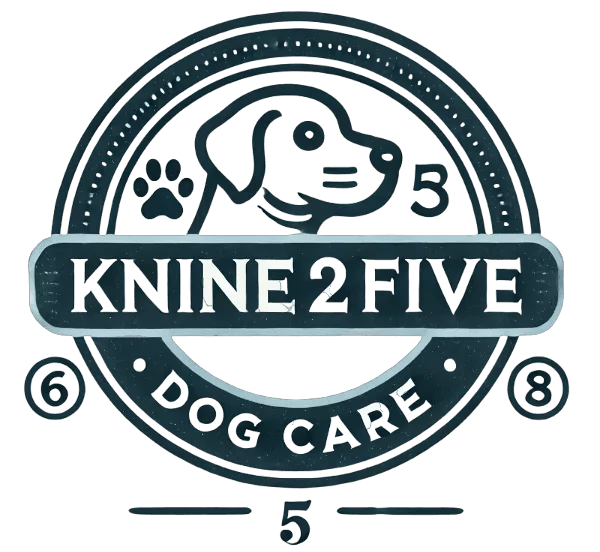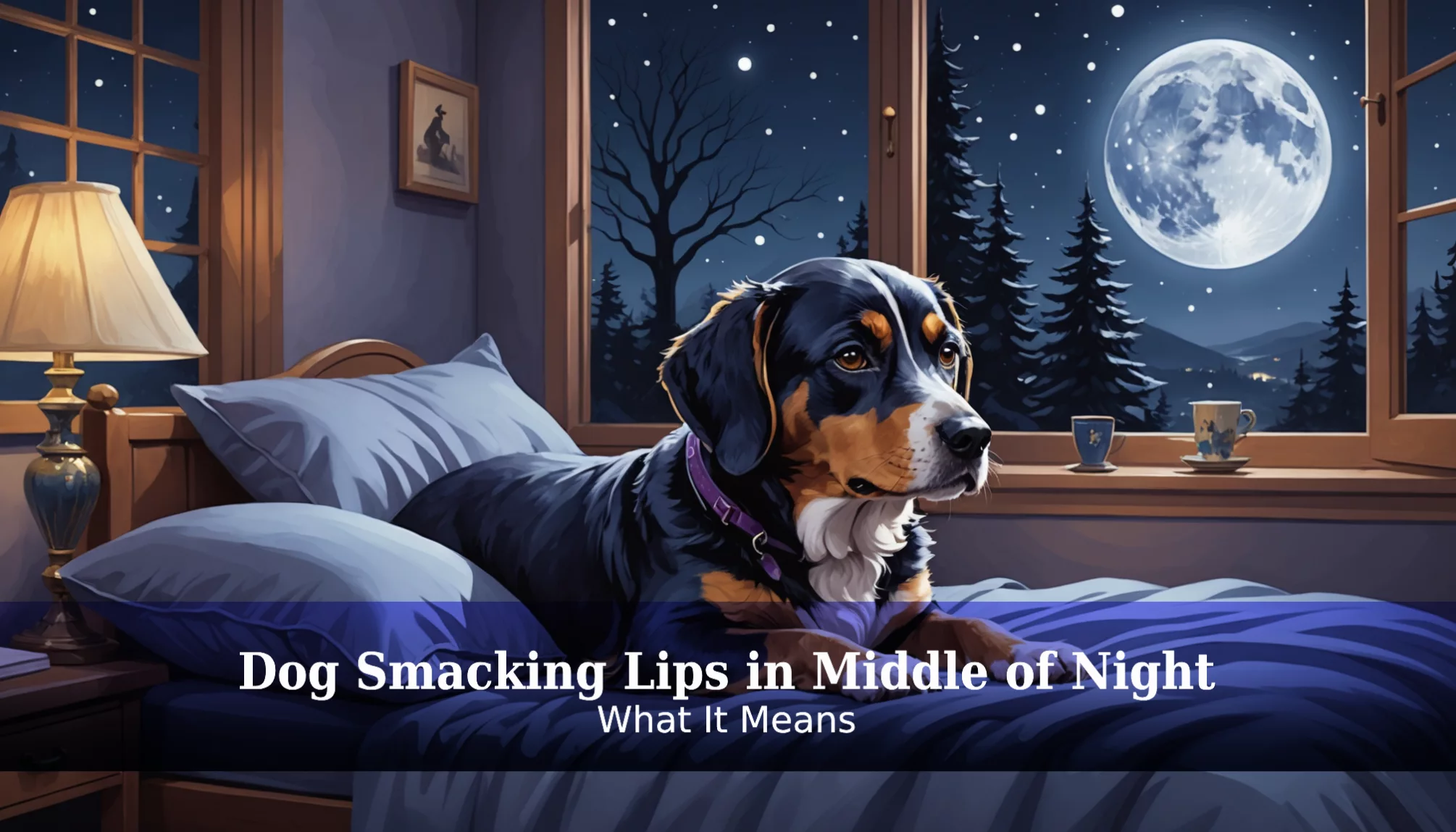Have you ever heard your dog smacking lips in the middle of the night and wondered what they’re trying to say? This curious behavior can leave pet owners scratching their heads! Understanding why your furry friend smacks and licks their lips is important. It could mean they’re hungry, anxious, or even feeling nauseous. If ignored, these signs can lead to bigger problems for your pup’s health and happiness.
In this article, we’ll explore the reasons behind this nighttime lip smacking. We’ll discuss how hunger signals can manifest in dogs, the role of saliva, and even when lip smacking might indicate a health issue. By the end, you’ll be better equipped to interpret your dog’s nighttime behavior and help them feel more comfortable. So, let’s dive in and uncover the mystery behind your dog’s lip smacking!
Understanding Why Dogs Smack Their Lips in the Middle of Night
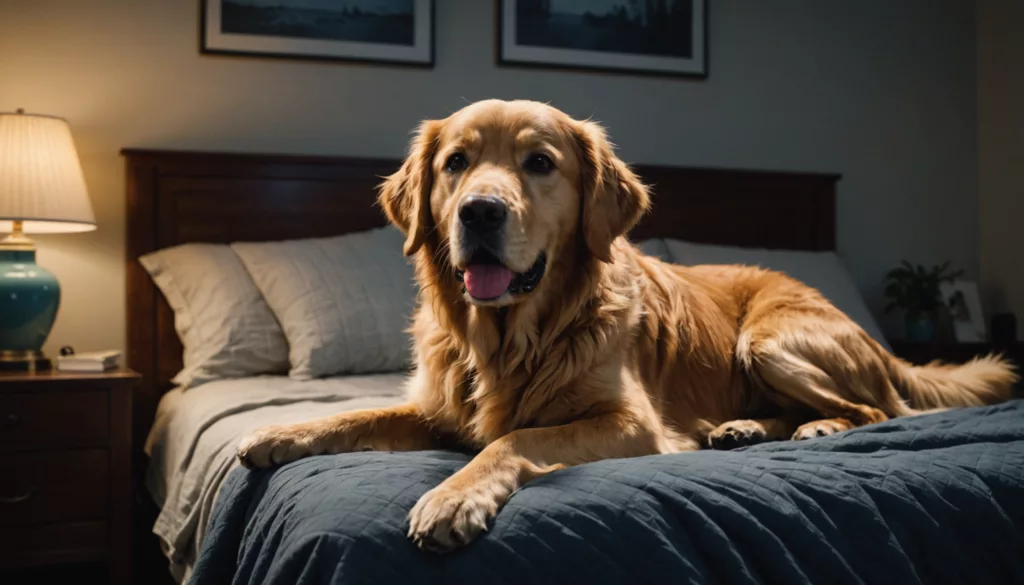
Dogs display various nighttime behaviors, including lip smacking, which can signal different health and behavioral conditions. Understanding these signs helps identify potential issues and ensure proper care for canine companions.
Do Dogs Smack Their Lips Due to Stress or Anxiety?
Stress and anxiety often trigger lip smacking in dogs, especially during nighttime hours. Dogs experiencing separation anxiety show several signs:
- Excessive salivation and lip smacking
- Pacing and trembling
- Destructive behaviors when left alone
Dogs use lip smacking as a calming signal when feeling nervous or submissive. This behavior helps them communicate discomfort and often serves as a way to seek attention or reassurance from their owners.
The Role of Saliva in Dog Lip Smacking
Saliva production plays a vital role in canine health and comfort. Dogs naturally lick their lips to:
- Manage saliva levels
- Aid in grooming
- Enhance their sense of smell
- Control body temperature
Abnormal salivation patterns or frequent lip smacking may indicate underlying health concerns. These behaviors sometimes point to conditions affecting the salivary glands or oral health that require veterinary attention.
Could Nausea Be Causing Your Dog to Lick Their Lips?
Nausea commonly causes dogs to smack or lick their lips during nighttime hours. Watch for these additional symptoms:
- Vomiting or dry heaving
- Lethargy or reduced activity
- Changes in eating habits
- Increased drooling
A veterinary examination becomes necessary when lip smacking persists or appears alongside other unusual behaviors. Regular monitoring helps identify patterns that might signal health issues requiring professional attention.
Is Your Dog Licking Their Lips Because They Want to Eat?

Dogs use specific signals to communicate hunger and other needs. Understanding these behaviors helps provide better care for these faithful companions. Here’s what to know about lip-licking behaviors in dogs.
How Hunger Signals Manifest in Dog Behavior
Dogs display clear signals when feeling hungry. Lip smacking and licking often indicate a desire for food, especially at night. This behavior typically occurs alongside other hunger signs like:
- Standing near food bowls
- Following family members around
- Pawing at food storage areas
- Making soft whining sounds
These actions stem from natural instincts that help dogs communicate their needs to caregivers.
The Connection Between Smacking and Appetite
Lip smacking behavior often links directly to food anticipation. Dogs produce extra saliva when they:
- Smell nearby food
- Approach regular feeding times
- Notice food preparation activities
- Remember previous feeding patterns
This increased salivation leads to more frequent lip smacking, particularly during usual mealtimes or when food scents are present.
Tips for Understanding Dog Eating Habits
Creating healthy eating routines helps prevent excessive lip smacking:
- Set consistent meal times
- Monitor portion sizes carefully
- Watch for changes in eating patterns
- Notice timing of lip-smacking behavior
Signs that warrant veterinary attention include:
- Excessive nighttime lip smacking
- Loss of appetite
- Drooling more than usual
- Changes in normal eating habits
A regular feeding schedule combined with careful observation ensures proper nutrition and helps identify potential health concerns early.
Understanding Dog Salivary Glands and Lip Smacking
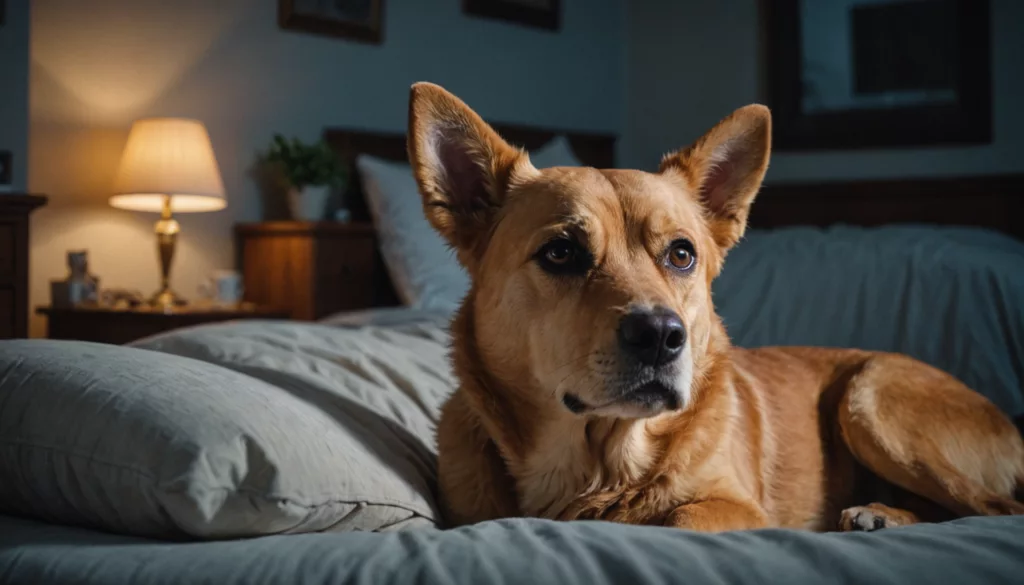
Salivary glands play a vital role in canine health and behavior. These glands produce saliva that aids digestion, maintains oral health, and influences various behaviors. Here’s what pet owners need to know about salivary glands and lip smacking in dogs.
Saliva Production and Lip-Smacking Behavior
Dogs produce saliva through four main pairs of salivary glands. The fluid contains enzymes that help break down food and antimicrobial compounds that protect oral health. When these glands become active:
- Saliva increases before meals due to food anticipation
- More saliva flows during excitement or stress
- Production changes based on smell and taste stimuli
This natural process often leads to lip smacking, especially at night when other stimuli are reduced.
Health Signals from Abnormal Saliva Production
Changes in saliva production often signal underlying health concerns:
- Excessive drooling may indicate dental problems
- Reduced saliva points to possible dehydration
- Sudden changes could reveal systemic issues
- Thick or discolored saliva suggests infection
Regular monitoring helps catch these warning signs early.
Signs of Oral Discomfort
Dogs experiencing mouth pain display specific behaviors:
- Frequent lip smacking or licking
- Reluctance to eat hard foods
- Pawing at the mouth
- Changes in eating habits
- Bad breath or bleeding gums
These symptoms warrant prompt veterinary attention.
Managing Ongoing Lip-Smacking Behavior
Long-term lip smacking requires careful attention:
- Track when the behavior occurs
- Note any accompanying symptoms
- Monitor eating and drinking patterns
- Document changes in frequency
- Keep a log for veterinary visits
Early intervention prevents minor issues from becoming serious health problems.
Common causes of nighttime lip smacking:
- Active salivary glands
- Oral discomfort
- Stress or anxiety
- Digestive issues
- Medical conditions
Attention-Seeking Behavior: When Dogs Smack and Lick Their Lips
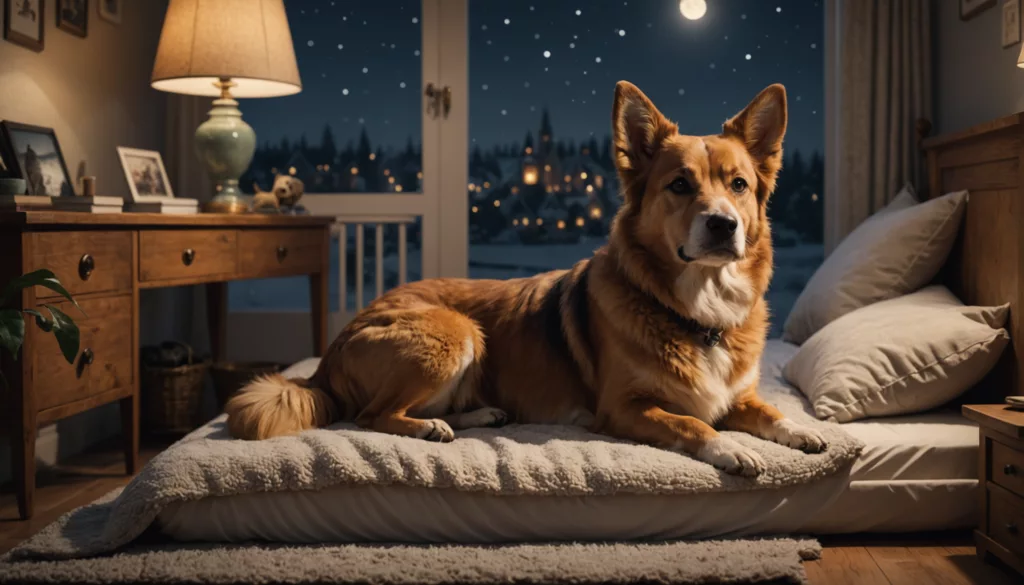
Night-time lip smacking in dogs often signals a need for attention or comfort. Understanding these behaviors helps create better solutions for both pets and their owners.
Why Dogs Seek Attention at Night
Dogs smack their lips at night for several reasons. Changes in routine, like a new home or family member, can trigger this behavior. Nighttime anxiety may cause dogs to seek reassurance through lip smacking and other attention-getting actions. Many dogs learn that making these sounds brings comfort or treats from their owners.
Signs of a Dog Needing Attention
Lip smacking often indicates a desire for companionship. Dogs left alone during the day might display these behaviors more at night. Common signs include:
- Repeated lip smacking sounds
- Following owners around
- Increased vocalization
- Restless behavior
- Pawing or nudging
Solutions for Night-time Lip Smacking
Several strategies help reduce attention-seeking behaviors:
- Daily Exercise
- Schedule regular walks
- Include playtime before bed
- Provide mental stimulation through games
- Create a Routine
- Set consistent feeding times
- Maintain regular bathroom breaks
- Establish a bedtime schedule
- Positive Training
- Reward calm behavior
- Ignore attention-seeking lip smacking
- Offer comfort toys at bedtime
- Environmental Adjustments
- Provide a comfortable sleeping area
- Use calming aids if needed
- Keep the nighttime environment quiet
These methods help address the underlying causes of lip smacking while strengthening the bond between dogs and their owners. Regular exercise, consistent routines, and proper training create a more relaxed nighttime environment for everyone. (American Kennel Club)
The Link Between Nausea and Dog Licking Behaviors
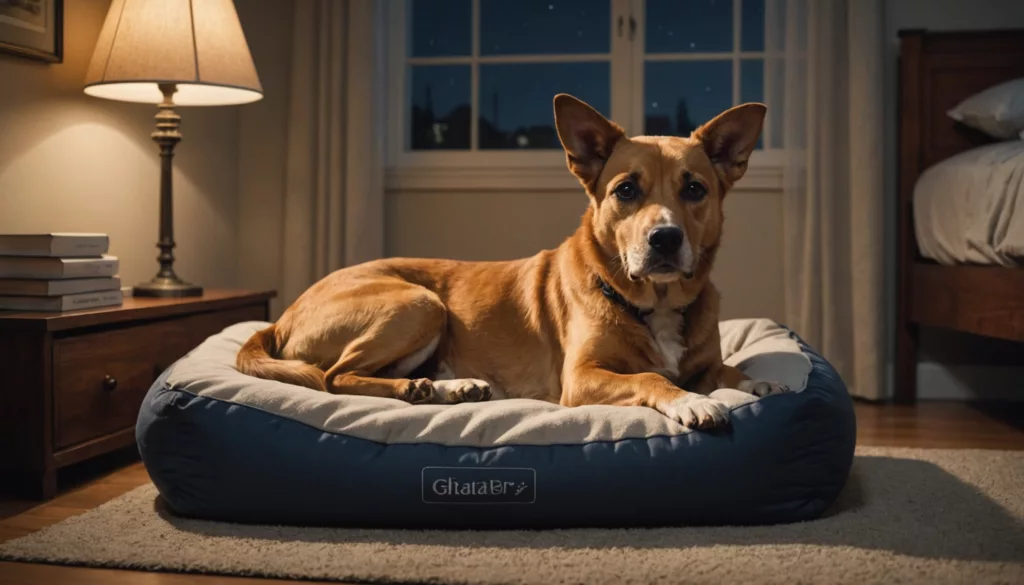
Dogs communicate discomfort through various behaviors, including lip smacking and licking. Understanding these signs helps identify potential health issues early.
Signs of Nausea in Dogs
Dogs display specific behaviors when experiencing nausea or digestive discomfort. The most common signs include:
- Frequent lip smacking or licking the air
- Increased drooling or excess saliva production
- Restless pacing or seeking quiet spaces
- Reduced interest in food
- Whining or showing signs of distress
A dog smacking lips in the middle of night often signals an upset stomach or nausea. These behaviors typically increase during periods of digestive distress.
When Lip Smacking Signals Health Issues
Consistent lip smacking requires attention, particularly when occurring at night. Watch for these warning signs:
- Lip smacking combined with lethargy
- Vomiting or dry heaving
- Changes in eating patterns
- Signs of oral discomfort
- Unusual nighttime restlessness
Regular monitoring helps distinguish between normal behavior and potential health concerns. Track the frequency and timing of lip-smacking episodes.
Managing Nausea in Dogs
Several proven strategies help address nausea in dogs:
Diet Modifications:
- Offer small portions of bland food
- Serve boiled chicken with white rice
- Maintain regular feeding schedules
Hydration Support:
- Provide fresh water constantly
- Consider pet-safe electrolyte solutions
- Monitor water intake
Professional veterinary care becomes necessary if symptoms persist beyond 24 hours or worsen over time. A veterinarian may recommend:
- Blood tests to check organ function
- Physical examination of the mouth and throat
- Diagnostic imaging when needed
Key Action Points
- Document when and how often lip smacking occurs
- Note any patterns or triggers
- Address basic needs first (food, water, comfort)
- Consult veterinary care for ongoing concerns
Conclusion
In conclusion, understanding why your dog is smacking their lips at night can help you take better care of them. It might be a sign that they’re hungry or feeling anxious, and factors like saliva production and nausea could also play a role. Paying attention to these behaviors can help you recognize if your furry friend is in pain or needs something specific.
Remember, if you’re ever unsure about your dog’s lip smacking, it’s always a good idea to talk to your vet. They can provide insights tailored to your pet’s needs. Keep observing your pup and enjoy exploring their unique personality!
FAQs
1. Why do dogs smack their lips in the middle of the night?
Nighttime lip smacking in dogs stems from several causes. The behavior often signals stress or anxiety, serving as a natural calming mechanism. Other common reasons include increased saliva production, hunger signals, or potential health concerns that require monitoring.
2. What does lip smacking indicate about anxiety?
Lip smacking serves as a calming signal when dogs feel anxious. This natural behavior helps dogs manage stress and communicate discomfort. The action often accompanies other calming signals like yawning or head turning.
3. Is lip smacking related to hunger?
Dogs often smack their lips when hungry. Additional hunger signs include:
- Pacing near food areas
- Whining or soft vocalizations
- Staring at food bowls
- Following people to the kitchen
Regular feeding schedules help reduce hunger-related lip smacking.
4. When might lip smacking signal health issues?
Contact a veterinarian if lip smacking occurs with:
- Excessive drooling
- Loss of appetite
- Vomiting or diarrhea
- Lethargy
- Signs of oral pain
These combinations may indicate underlying health conditions requiring professional care.
5. How can pet parents help stressed dogs who smack their lips?
Create a calming environment by:
- Providing a quiet, safe space
- Maintaining consistent daily routines
- Offering appropriate exercise
- Using calming aids recommended by veterinarians
- Reducing exposure to known stressors
